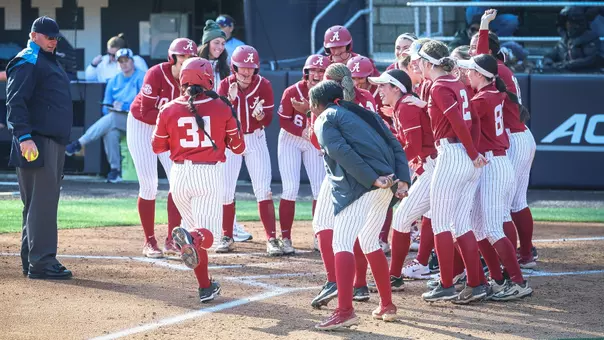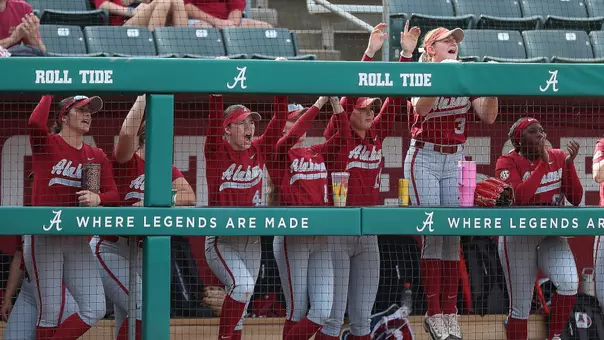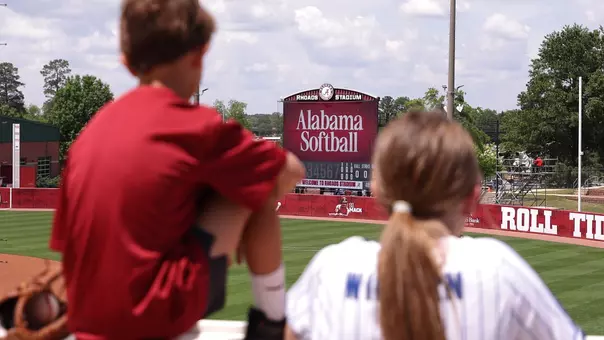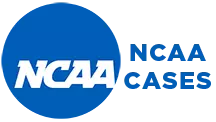All-American Flashback: Kelly Kretschman (1998-2001)
10/20/2015 12:00:00 AM | Softball
In honor of Alabama softball's 20th anniversary, rolltide.com will be catching up with our 20 former All-Americans in a series of features. Our first is with Kelly Kretschman (1998-2001), Alabama's first All-American and one of five in program history to win four All-America awards.
Kelly Kretschman was Alabama's first All-American and she still holds school career records in slugging percentage (.766), runs scored (288), hits (368), home runs (60) and is ranked in the top five in nearly every offensive category. Her journey towards becoming one of the best players in program history began thanks in large part to the coincidental timing of the 1996 Olympics, which exposed her to the sport of softball as a high schooler in Indian Harbour Beach, Fla.
"I played baseball, soccer and basketball growing up but when I realized I could play softball in the Olympics and I watched that team win a gold medal, I started getting interested," Kretschman said. "I started to pay more attention to college softball after that. At the time, I had no idea that Alabama was going to start a softball program. I remember watching Alabama football on TV when I was younger. When they first started recruiting me, I recognized them from their football team and they were a Nike school which was a pretty big deal back then."
Unlike today, the state of Florida was not a softball recruiting hotbed when Kretschman was playing in the late 90s. With no local college softball tradition, the most talented recruits from the southeast typically went to the west coast or to one of a handful of mid-major programs in the area. The addition of softball into the Southeastern Conference in 1997 started a seismic shift in the world of college softball, but at the time those teams had to recruit locally and sell lesser-known recruits on the potential of the conference.
Alabama was able to score the proverbial diamond in the rough with Kretschman, due partially to the lack of major recruiting in the area and also due to her own admitted obliviousness to the world of college softball.
"I was only recruited by a few schools and Alabama was one of them," Kretschman said. "I was very close to committing to LSU because they would have allowed me to play soccer as well, but I just felt more at home when I visited Alabama. The coaching staff made it feel like a family and I liked the girls that were there.
"Honestly, I was so oblivious to the college softball scene. Who the best team in the country was really didn't matter to me. I was so oblivious to what schools even had college softball. I knew the big ones like UCLA and Arizona because you always saw them play in the Women's College World Series final on TV. The awareness of college softball then was nowhere near what it is today. I just recognized the name brand of the University of Alabama and I didn't really care that it was just the second year of the program's existence."
Kretschman established herself immediately on the college softball scene, earning Second Team NFCA All-America honors her first two seasons and First Team accolades as a junior and senior. She was the first four-time All-American at Alabama and only four others have managed the feat since.
"Looking back on it, I love the fact that I was able to help build the program to what it has become now," Kretschman said. "I would have much rather done that than play at a place like UCLA or Arizona. I have a lot of friends that went to those schools at that time and they were just continuing success that had already been established. I can say that I started something that has now been successful for a long time."
Kretschman is regarded as arguably the best player in program history, though by her own admission she was not a very strong practice player. Seeking ways to stay engaged in practice, she turned to teammate and fellow All-American Ginger Jones.
"I remember at practice, Murph always put me in the same hitting group as Ginger Jones," Kretschman said. "Admittedly, I wasn't really a great practice player, but Ginger made practice fun and competitive for me. I think because of that, we both got better and she ended up as an All-American too. We would play home-run derby against each other and I remember one practice I had more home runs than her one round and she wanted to use my bat the next round. I told her it had nothing to do with my bat but she insisted. Sure enough, she broke my bat and I was livid! I remember that and constantly competing against her. She wouldn't let me try to beat her in any competition and it brought the level of competitiveness up for everybody."
As Kretschman's career progressed, so did the national reputation of the program as a whole. Alabama made its first NCAA Tournament appearance in her sophomore season, moved from Sokol Park to the Alabama Softball Complex, now known as Rhoads Stadium, in her junior season and then made its first appearance at the Women's College World Series later that season.
In just its fourth year of existence, Alabama was a sizeable underdog in Oklahoma City against the perennial west coast powerhouses. The weekend's opening banquet emphasized that fact to Kretschman, but it also provided Alabama a platform to demonstrate the true spirit of the sport.
"I had been on the national team for two years prior to us making the World Series, so I knew a lot of the girls at the banquet from that," Kretschman said. "I remember hearing the stories from all the west coast schools. Since they all played each other, they all had inside jokes and stories about the games they had played. Paula White, a walk-on from Atmore, Alabama on our team was our representative to speak at the banquet. She talked about how amazing it was that a girl from Atmore, Alabama who had never played fastpitch softball before coming to Alabama would be here at the Women's College World Series. I remember looking my national team teammates during her speech. It really reminded them what the game is really all about. It took them back to the real reason why we're all here to play this game. It was then that the magnitude of the moment really hit me that we had officially arrived at the World Series."
Her four-year career at Alabama introduced Kretschman to a softball world that she is still very active within. Kretschman just completed her 10th season with the USSSA Pride in the National Pro Fastpitch league and has no intention of retiring any time soon. Additionally, she is an assistant coach at Texas State along with USSSA Pride teammate and former Texas All-American pitcher Cat Osterman.
"I always knew that I wanted to coach in college," Kretschman said. "When that was going to be, I had no idea. I'm the oldest player in the National Pro Fastpitch league right now and I plan on continuing to do so. I feel like I'm in the best shape I've ever been in my life. I coach at Texas State right now and the fact that I get to do something that I love every single day is amazing. The love for the game will always be there, it's just a matter of how long my body will keep allowing me to do so. I thoroughly enjoy the fact that I can help these kids get better every day and I can give back to the sport that has given me so much."
In addition to her lessons learned on the field at Alabama, Kretschman is passing on many of the lessons she learned off the field to the next generation of players while trying to implement them in her own life as well.
"I've taken the morals and standard that the Alabama coaches instilled in us with me after I graduated," Kretschman said. "It's the way we're taught to treat people all the time and knowing that, no matter where you are, people are always watching. If you want to be treated a certain way, you have to treat others that way. One thing that Coach Murphy was big on was sending thank you letters to let people know you appreciate them. That's one thing I still try and do today. It's a lot of little things that people don't realize that can go a long way. I love the fact that now they hand-deliver season tickets out to fans in Tuscaloosa and other programs have started to do the same thing. You start to build and maintain a culture and now that a lot of us former players are in the coaching ranks, we will be instilling a lot of those things in our own programs."








